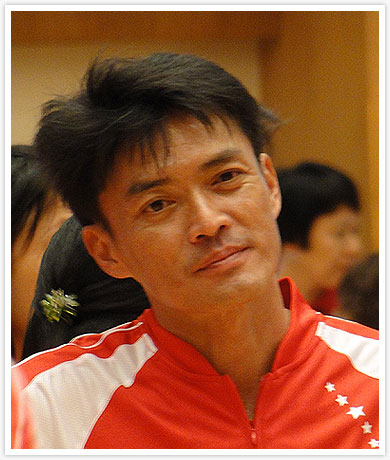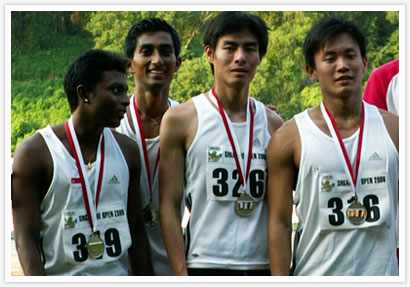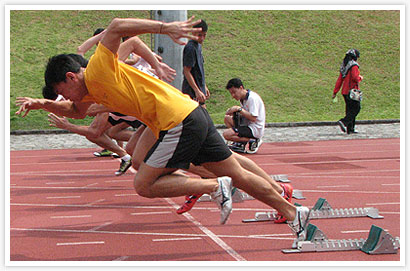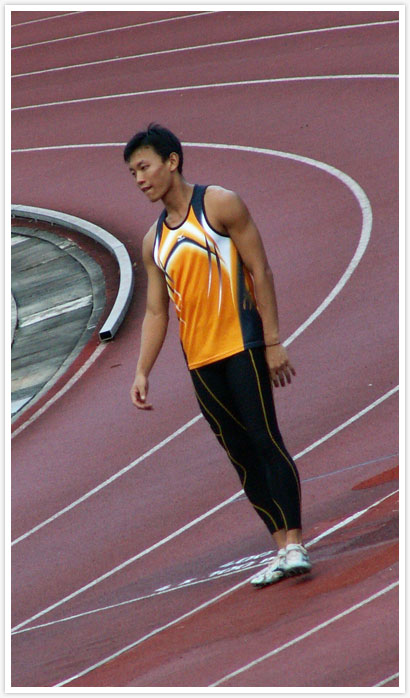|
Posted by Sha
|
Filed under Interviews, Spotlight
|
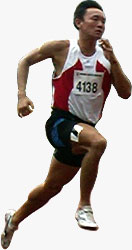 Within our local athletics scene, the mention of the name Kenneth Khoo, athletes and coaches alike will tell you that he’s a quarter-miler specialist.
Within our local athletics scene, the mention of the name Kenneth Khoo, athletes and coaches alike will tell you that he’s a quarter-miler specialist.
Synonymous with the 400m event, being that he’s been in the scene for more than a decade, the 28-year-old attributes his longevity in running as a late starter in athletics.
His maiden foray into sprinting only started when he met his first and still his current coach, Melvin Tan, who was a PE teacher then, at Catholic Junior College back in 1999.
From then onwards, the three-time SEA Games seasoned athlete, has followed in the footsteps of his mentor, and is now a PE teacher himself at ACS Barker.
He was part of the 400m resurgence back in the late 90’s, where over the years these bunch of young quarter-milers came of age and achieved the second-best time ever recorded in the 4x400m relay; 3:13.70 at the 2007 SEA Games, just a few seconds trailing behind the national record of 3:10.55.
Currently ranked as the fourth fastest athlete in the 400m event ran by a Singaporean with a time of 47.77 seconds achieved in 2007, Kenneth believes he still have more ‘mileage’ in him.
He is currently training hard to surpass his life-time best during this all-important SEA Games year, and it goes to show that the last thing to age on somebody is their heart.
Name: Kenneth Khoo
Height: 1.73m
Weight: 70kg
Date of Birth: 15 Mar 1982
Coach: Melvin Tan (1999 – present)
Personal Best(s):
100m – 11.11s (All-Comers 2009)
200m – 21.51s (IVP 2007)
400m – 47.77s (Singapore Open 2007)
800m – 1:57.4s (Woodlands Wellington Invitation 2002)
Tell us of your current situation.
I’m currently teaching at Anglo-Chinese School (Barker Rd). It’s one of those jobs that allow me do the things I love, teaching sports and history.
Kenneth romping away to a personal best of 21.51 seconds at the IVP 2007 Championship in the 200m finals (Lane 4, Red White kit and black tights).
How did you get you start in athletics?
I always loved running. Since young, I loved games that involve a lot of running. It’s just a liberating feeling to be able to outrun the other kids and to run around freely. However, I only took up the sport in my junior college days as my secondary school didn’t have an athletics team.
How has your coach helped to develop you all these years.
Coach Melvin Tan captured here at the flag presentation ceremony of Asian Games 2010, held at Catholic High School last November.Throughout my entire career, I’ve been blessed to be able to train with my current coach, Mr. Melvin Tan. His patience and sincerity, along with his constant drive for self-improvement has helped me achieved so much in the sport since the first day I came to him as a skinny, wide-eyed teenager of 17.
I think words alone cannot describe all the things he has helped me with. But I guess it’s just an amazing privilege to be able to work closely with someone like him for the past decade. He’s not only a great coach to me, but a mentor and a role model off the track as well.
Who do you look up to when you’re starting your maiden journey into athletics? And who do you look up to for inspiration currently?
I had lots of heroes when I was growing with the sport. Michael Johnson and Carl Lewis were just 2 of the many.
But I’ve always been impressed with our very own Mr. Kunalan. He was a role model to me for many reasons. First and foremost, he was a little Singaporean man who achieved great things in the sport, proving that size does not matter. Many of his achievements were also attained over the age of 30 years old as a working adult.
The working-training balance is something I could really relate with and it gives me strength to believe that if someone else could do it, so could I. It’s this idea that he was an great athlete, yet he was someone many people could identify with; that resonated with me. I think you already know most of his achievements. After all, anyone who can run a 48s 400m in his late 30s would most certainly rank very highly on my idols list!
Family, how’s the support level from them? How important do you think is family support.
My parents were initially cautious about my involvement with the sport as they were concerned that it would take me away from my studies. When I convinced them that I could juggle the both adequately, they became more supportive.
In today’s local context, parental support is everything. It’s just great to come down for meets and see parents and relatives cheering themselves hoarse for their kids. This is the kind of atmosphere that would most certainly revive the sport locally. Making difficult educational choices based on sports (e.g. going to sports school, or skipping exams for competitions) will be considerably easier for the athlete if he/she had lots of parental support as well.
Why 400m? Why not the century sprint, or the 200m?
I started out as a 100m runner (like every other sprinter) and I didn’t go very far largely due to my small build then. My coach then convinced me to try the longer sprints as he noticed that I had more endurance than the other sprinters and this could work to my advantage. I’ve stuck to the 400m since then.
Kenneth clocking an impressive 47.77 seconds in the 400m finals of the Singapore Open 2007. (Lane 6, black tights with red white kit).I love the event due to its all-encompassing nature. It has the dynamism of a sprint event, and yet also possesses the tactical aspect of a distance event. I like the feeling of thinking and making quick decisions during the race. This makes the 400m exciting. Like any other normal human being though, I do not like the lactic acid.
The 100m is way too short. Most sprinters can finish it in one breath. Before you know it, it’s over. The 200m was an event which I grew to love only later on. My coach encouraged me to run some 200m races to get my speed up and also for variety. I still race it now and then but my first love will always be the quarter mile.
Over the years I’m sure you’ve tried every possible running tactics for the 400m. What works for you?
You said it! I tried starting fast, starting slow, sprinting, coasting, every conceivable tactic, I’ve tried it all! But what really works for me is to start at a fast, yet relaxed and comfortable pace, something that lets me get to the first 200m at <23s easily. Then the last 200m is basically about continuing to stay relaxed despite the lactic buildup and bringing it home. When and where I make my move depends on who I’m running with. Don’t you just love tactics and mind games!
What do you think it will take to break the long-standing 400m and 4x400m record?
4-5 dedicated athletes running under 48.5s, and a lot of belief and self-motivation.
I think the biggest problem preventing us from taking that record down is the fact that our very own athletes don’t seem to believe it can be done. A few years back, Singapore had 4 different athletes who ran 47s in 4 successive years. Yet, the 4 of us couldn’t run together in a relay. That remains one of the biggest regrets of my career. But I think it should be a reminder to the next generation of 400m athletes that it can be done.
The national 4x400m squad circa year 2006. They won silver at the Singapore Open, finishing in a time of 3:18.38
Has any injury plague you before?
I’ve never had anything really serious enough to require an operation. But a few injuries to the adductors, and lower back were particularly frustrating. I’ve had a few niggling injuries this year perhaps due to the lack of recovery from juggling working and training.
Do you take care of your nutrition? Your take on supplements and food.
I’ve tried watching my diet now and then but these days, it’s just free for all. There’re a few important nutrition rules I keep like no gorging before endurance workouts. The food simply ends up on the track in processed form.
As for supplements, my advice is to do your own intensive research before consuming. What works for athlete A doesn’t necessarily work for athlete B. I’ve tried some recovery supplements but they don’t seem to have a lot of effect. So I gave up after a while. These days I only take vitamins. Some athletes look to supplements for gaining mass and strength but you have remember, whatever mass and weight you gain, you carry it around the track with you.
Aside from athletics, what else interest you? You could say the other part of your life beyond sprinting.
I’m basically a history buff. I like to read up on historical stuff, it helps me in my job too!
How do you juggle work and training at the same time? How do you find the balance, or is there no such a thing.
Juggling work and training is a delicate matter and I’ll be honest, it’s not easy. Many good athletes I know have given up due to the fact that they couldn’t train and work at the same time. Going down this path means a lot of sacrifices. I get up at 6, reach school at 7, leave at 5, train till 8-9, have dinner and I only have enough time to sleep when I get home in order to get my 7-8 hours. The only thing that will get you through this punishing schedule is your love for the sport and a lot of discipline and effective time management.
Any athlete who’s going through this balance will tell you he has given up a great deal in order to make it work.
The 3:13.70 timing achieved by the 4x400m national team at SEA Games 2007. They finished in fifth position. (Lane 4, black outfit)
Being a former student-athlete, any advise for the kids who are in that phase currently?
Being in school is the best time to train, believe it or not. A former team mate once told me this, “if you wish to run more, study more”. I can’t emphasise how true these words are for me. If I had done badly for my ‘A’ Levels and was forced to work after NS at 21 years old, I could literally kiss my athletics career goodbye. What gave me such longevity in the sport is the fact that I did a 4-year degree at NUS, followed by a 2-year post-graduate diploma at NIE. I effectively bought 6 more quality years for me to train this way.
Of course there are sacrifices to be made as well. Time management is very important. You’ll have to roster your school hours, training hours, social and study time effectively in order to make this work. Most importantly of course, stick to the routine!
So kids, here’s something that your parents would like to hear, STAY IN SCHOOL!
Share with the readers, some aspects of your training. For example on a weekly basis, plus a short insight on your year long training program.
Generally, Monday is weights day, then Tuesday I’ll be doing sprints, both short and long. Wed is usually a rest. Thursday I resume with longer intervals, followed by another weights cum endurance session on Fri. Sat is back to speed again. Unfortunately, I can’t train as much as I used to due to work commitments, but that’s life I guess.
Kenneth Khoo trying out the blocks before his 100m race.On an annual basis, depending on when I end the previous season, I’ll usually take a month or 2 off. Just hanging out with friends, travelling or doing things I didn’t have a chance to do when I was training actively. Think it’s important to keep your mind off the sport in order to revive that hunger for the next season. Then I go into pre-season training for about 2 months, working on things like my aerobic base and basic strength, and finally to the specific phase to get my body conditioned to race again.
The life lesson learned from your ban? Do refresh us readers the reason behind the ban itself.
The ban was an interesting chapter in my career. Basically there was some unfairness and confusion with the selection of the 4x400m team in 2005 and we missed the qualifying race for the SEA Games as a result. The national selectors perceived it as some form of protest on our part and we were given a disciplinary hearing and subsequently banned while the SAA (back then) was absolved of all guilt.
The entire episode certainly reinforced my belief that training and selection should always be fair and transparent and that one should always stand up for what you believe in. A lot of unpleasantness could’ve been avoided had there been active effort to engage athletes with a fair selection process.
That being said, it’s been 5 years and all the parties have moved on. Sport after all is about healing rifts and not creating them. If we do not move and continue to bear grudges, we end up placing ourselves as obstacles preventing the sport from moving forwards.
Having been in the scene for a long time now, what kind of legacy would you like to leave behind?
Well, legacy is not a word I’m comfortable with since I haven’t had any major regional accolades to speak of. But one thing I would love to see would be 400m in Singapore evolving and progressing to greater heights. Eventually, both the individual and 4x400m relay records have to go, and soon too!
What was the highlight of your athletic career?
I’ve not had a career laden with regional success and medals, but there were a few highs I could name. Captaining the 4x400m team was one, it was truly an honour to be able to serve your country in this way. I also felt honoured to be able to race with and alongside dedicated team mates like Firdaus, Muthukumar and Shafiq. Our constant competitions have pushed me to become a better athlete.
One of Kenneth recent races last year. The Men’s 400m A Finals – 3rd SDSC Invitational Series Meet 2010, where he clocked 49.54 HT.
Your opinion on the current state of local athletics.
The problem (as I see it) plaguing athletics the past few years was the lack of a transparent selection criterion. This was a major source of discontent for many athletes like me. For a sport like athletics, where timing, distance and height are tangible figures, I find it hard to fathom that we’re unable to nail down a fixed selection criteria to determine the best and whoever is going to represent us at meets. A lot of goodwill was lost over dodgy and shady selections in the past and I think this is one problem the new team has to fix.
Well, the new management team certainly isn’t wasting any time rolling out the changes. Many of new initiatives look exciting and I think they could possibly give athletics a huge shot in the arm. I for one am looking forward to the first ever National Championships!
What’s your upcoming goals?
For now as my work commitments continue to pile up, it’s hard to have any long term plans unfortunately. I have to take it one season at a time. The immediate goal however is still to qualify for the Palembang SEA Games in 2011. I would of course love to continue running the way veteran athletes like Shyam and Chamkaur do.
Are you any closer to qualification for SEA Games 2011 in Indonesia?
With the qualifying mark for SEA Games 2011 set at 3:26min for the 4x400m, it remains to be seen if SNOC or the SAA would revise the timing to make it more challenging. Whatever the case, I think it’s time we stopped finding excuses for ourselves and started challenging seriously for medals as a team.
The 400m qualifying stands at 47.53, one of the slower times in recent years. But that would require a personal best effort on my part, something that I’m currently working hard towards.
Qualifying for SEA Games is on Kenneth’s goal this year
Athletes like you make a lot of sacrifices. Would you like to share with the readers some of them? If given a choice, would you do it all over again same, or perhaps would you venture into another field of sport perhaps?
Yes I’ve put in a lot of sacrifices. Most of the choices I made in my life the past couple of years are structured around athletics (education, work etc.). Would I have it any other way? Of course not! I think athletics has made me a better person in terms of instilling discipline, fortitude and commitment. I wouldn’t be the person I am today without the sport and for that, it will always be my passion.
|
11th Jan 2011
|
Tags: Kenneth Khoo, Melvin Tan
|

